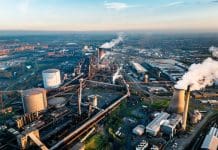Three cladding companies, whose poor practices were uncovered by the Grenfell Inquiry, have been warned by the government that they will face “severe consequences” if they do not provide a comprehensive financial package to fix unsafe buildings
Grenfell Tower, a high-rise block of flats in North Kensington, West London, caught fire on 14 June 2020. The building burned for 60 hours, killing 72 people and injuring 70 more. The fire was caused by an electrical fault in a refrigerator on the fourth floor and spread rapidly through the building, accelerated by dangerously combustible aluminium composite cladding.
The cladding companies have been addressed by the secretary of state
Michael Gove has written investors in Kingspan, Arconic, and Saint-Gobain, urging them to use their influence to encourage firms to “engage constructively in helping us reach a just resolution for all concerned.”
Shareholders, including Blackrock, Vanguard, and Fidelity Management and Research, all received letters from the Secretary of State for Levelling Up, Housing and Communities of the United Kingdom. The letters detailed the importance of incorporating ethical awareness and integrity in their work.
Shareholders of these companies were warned that if their manufacturers did not provide a comprehensive financial package, then the focus of the Department for Levelling Up, Housing and Communities would turn to them, and the consequences would be severe.
The letters also state that the shareholders’ reputations, as well as their financial stake, could be significantly damaged if the secretary is required to use the “legal and commercial tools available” to ensure the position of the cladding companies.
“I have always been clear that those responsible for the building safety crisis must pay. But despite the fact that their products continue to put lives at risk, some cladding firms have no intention of doing what’s right and addressing their moral and financial obligations to innocent residents,” said Gove.
“Today, we ask responsible investors to use their influence to encourage these companies to come forward immediately with a comprehensive financial package for remediation work. It cannot be right that cladding companies continue to profit whilst so many innocent, hardworking people face financial hardship and misery,” he continued.
The cladding companies are yet to pay any costs
So far, three construction companies have been identified as being responsible for manufacturing the majority of cladding used in the Grenfell Tower. To date, these companies have provided no financial contribution to fixing buildings in the United Kingdom that their products have made unsafe.
The Grenfell Inquiry revealed poor behaviour from all three companies, including the sale of flammable products that were inappropriate for their end use, the mis-selling of construction products through inaccurate marketing, and the misappropriating of safety test results.
Last month, Michael Gove wrote to the bosses of Kingspan, Arconic and Saint-Gobain requesting that they meet officials from his department and explain how they will identify and pay for remediation works.
The invitation came after Kingspan publicly announced that it would be willing to finance remediation costs where its products had been used inappropriately. Kingspan agreed to meet DLUHC officials; however, none have committed to any new remediation funding.
Attempts to make cladding companies pay for remediation are proceeding alongside measures from the Department to ensure developers and freeholders contribute to the repair costs for unsafe buildings.
New laws aim to make UK buildings safer
There are currently 46 signatories on the landmark Developer Remediation Contract, which commits in law for the first time that developers must fix all life-critical fire-safety defects in English buildings over 11 metres if they had a role in the development or refurbishment of the building.
In addition to this, the Department’s Recovery Strategy Unit has increased litigation against irresponsible freeholders who have not remediated buildings they are responsible for. This has included penalties against GreyGR, who are owned by the billion-pound railway pension fund, RailPen.
An Independent Review by Paul Morrell and Anneliese Day KC, looking at the current testing regime for construction products, has recently been published.
The report was commissioned in response to the Grenfell Tower Public Inquiry’s revelations on the behaviours of manufacturers and those responsible for advising on the fire performance of products.
“We are very pleased to see the publication of this Review. Paul has immense experience from the many senior roles he has played in both industry and government. We respect him for his intellect, understanding and objective approach to the challenges facing our industry,” said Peter Caplehorn, chief executive of the Construction Products Association.
The Department will now consider the recommendations of the Independent Review and publish proposals for reforms in due course.







![[Video] Fireco: 80 new fire doors required for residential flats in London](https://www.pbctoday.co.uk/news/wp-content/uploads/2025/04/2024-06-01-Lords-view-one_1200x750_004-218x150.webp)






